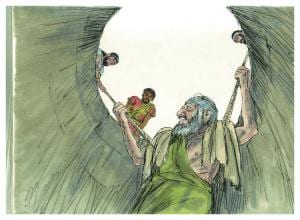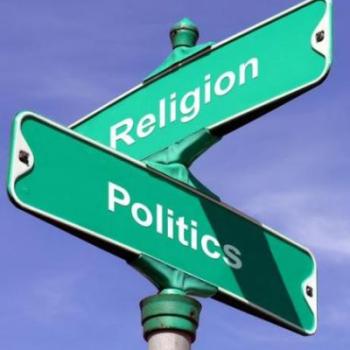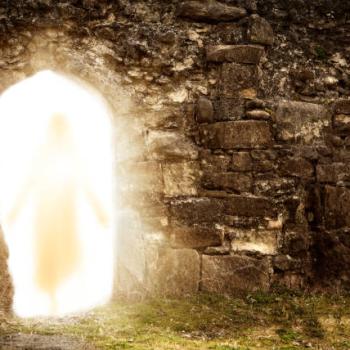
“Jeremiah ought to be put to death,” the princes said to the king. The priest-homilist at the church I visited yesterday explained why. Jeremiah was preaching defeatism instead of practical military strategy: Don’t align yourself with Egypt in hopes of salvation from the Babylonians. You can surrender and still be God’s people.
This priest also helped us deal with a really hard passage in Scripture, yesterday’s Gospel. Jesus has come to bring, not peace, but fire:
A household of five will be divided, three against two and two against three; a father will be divided against his son and a son against his father, a mother against her daughter and a daughter against her mother…. (luke 12:52-53)
Fire, often in Scripture an image of God, lights, cleanses, and also destroys. God, in the image of fire, does all of these in the Old Testament. A prophet lights up God’s way for us and also destroys the legitimacy of the status quo. Prophets have their friends, but they also earn their enemies.
A time to make enemies missed
Yesterday’s homily went on to recognize the Jeremiah in all of us. We have been baptized into Christ, into his roles as priest, ruler, and also prophet. If there ever was a Sunday to emphasize the controversial role of prophet, it was yesterday. That is exactly what the priest did. He even told us that we might well have to suffer for being God’s prophets. We would make enemies by proclaiming and living God’s word.
Still, I found one aspect of that homily disappointing. As far as I could tell, nothing in that homily could possibly have made a person any enemies. It was all vague generalities. Not a word that anyone could disagree with, much less object to strongly enough to kill for. I don’t think anyone in that congregation left feeling they were in danger from their prophetic mission.
In my mind it raised the question, are homilies supposed to be controversial? In the current American context, being controversial almost necessarily means being political. The Church leadership wisely, I think, avoids taking the side of one political party over another. But it does take sides on issues and it claims to follow Jesus’ preference for the poor and oppressed.
Experiencing the fate of Jeremiah today
That preferential option can get you killed. So can the option for the environment, for civil rights, for sanity around guns, or for honesty in government. Prophets who have faced death threats and even martyrdom for causes like these include news reporters, protesters, bishops and priests like the recently beatified Fr. Raymond Rother, religious sisters, catechists, and politicians, including heads of state.
All it takes for a prophet to earn enemies is to start gaining some success. That is the case with two teenagers featured on this blog–Greta Thunberg, the Swedish climate activist, and David Hogg, survivor of the school shooting in Parkland, Florida. Pope Francis is probably today’s most prominent prophet, a voice for many causes—the poor, the environment, peace, and a servant Church that wears “the smell of the sheep.” People around the world, and not just Catholics, love Pope Francis. But he has earned his share of enemies, even from within the Church hierarchy.
What homilies are for
The purpose of a homily cannot be to tell Catholics how to vote. That would be clerics shouldering a responsibility that belongs to the lay person. Just a surely the homily should help the parishioner understand the Sunday’s readings and apply them. One of the best descriptions I have seen says that homilies should encourage manifestations of faith among the faithful.
People can manifest faith only in the world, and only if they understand the world. That means homilists must have the courage to deal with difficult issues like poverty, discrimination, climate change, peace, guns, and so on. They must be prepared to present, with due humility, the facts as they understand them and scripturally sound principles. That frees us lay people to do our job, which may mean disagreeing but will surely mean finding our way of applying the message. And it just may mean that we also become Jeremiah in our public spaces, bringing God’s fire to earth even at the risk of making enemies.
Image credit: Trust in God: The Turtle’s Voice via Google Images













